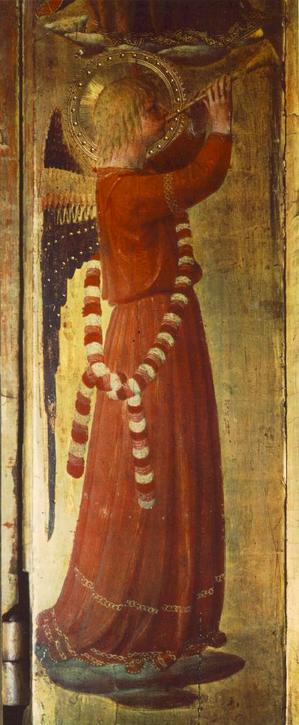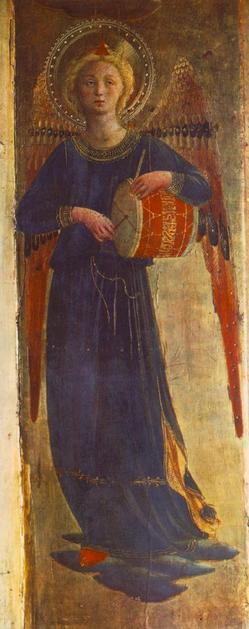The Catholic Information Service at the Knights of Columbus publishes a number of booklets on matters pertaining to the Catholic faith. Each of the 60+ booklets gives a very good introduction to what we believe but the booklets are neither the first word nor the last on the subjects they treat. One such booklet is All About Angels, and the following is an excerpt:
More often, however, angels appear in a multitude (cf. Daniel 7:10). When they do, the Old Testament writers employ military metaphors to describe their collective presence. Metaphors such as “host” or “army of the Lord” and “encampment of God” all suggest that angels could be found in large numbers, arranged in an orderly fashion. In rare displays of cordial greetings between men and angels, we are told the proper names of three angels: Michael (Daniel 10:13), which means “Who is Like God?”; Gabriel (Daniel 8:16), which means “Power of God”; and Raphael (Tobit 7:8), which means “God has healed.” These named beings were later identified by Catholic tradition as “archangels.” Although these personal names tell us something about the nature of God, they should not be considered solely as metaphors for God’s attributes. An archangel’s name, like our own, reveals the identity of a unique, personal being.
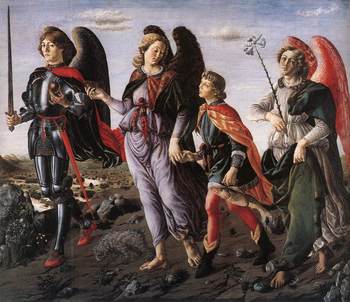 The Archangels are charged with protecting an individual or a multitude of individuals or with delivering solemn messages from God to man, such as when the Archangel Gabriel greeted the Blessed Virgin Mary with the news of the Incarnation.
The Archangels are charged with protecting an individual or a multitude of individuals or with delivering solemn messages from God to man, such as when the Archangel Gabriel greeted the Blessed Virgin Mary with the news of the Incarnation.
Finally, the Prayer after Communion on the Feast of the Archangels serves as a reminder that divine providence has placed us “under the watchful care of the angels” so that “we
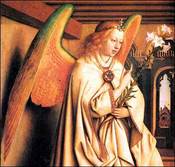 may advance along the way of salvation.” Through the liturgy of the Mass we are encouraged, then, to love, respect, and invoke the angels. Invoking the angels may seem like an odd practice, but when we recall that those angels who did not reject God are saints, we quickly realize that there is little difference between this practice and the ancient practice of invoking human saints. We pray to the angels as we do to the saints, for the same reasons, namely, so that they will guide and protect us, as well as intercede with God on our behalf. At the end of the funeral liturgy, in the Prayer of Commendation we invoke the angels and saints to aid and accompany us as we leave this world:
may advance along the way of salvation.” Through the liturgy of the Mass we are encouraged, then, to love, respect, and invoke the angels. Invoking the angels may seem like an odd practice, but when we recall that those angels who did not reject God are saints, we quickly realize that there is little difference between this practice and the ancient practice of invoking human saints. We pray to the angels as we do to the saints, for the same reasons, namely, so that they will guide and protect us, as well as intercede with God on our behalf. At the end of the funeral liturgy, in the Prayer of Commendation we invoke the angels and saints to aid and accompany us as we leave this world:
Saints of God, come to his/her aid!
Come to meet him/her, angels of the Lord!
Receive his/her soul and present him/her to God the Most High.
May Christ, who called you, take you to himself;
may angels lead you to Abraham’s side.
The Roman calendar sets aside two feast days to honor God’s invisible servants. In the wake of the Second Vatican Council’s reform of the sacred liturgy, we continue to celebrate (as we have for centuries) the feasts of the Archangels and of the holy Guardian Angels. The feast day of Saint Michael, Saint Gabriel, and Saint Raphael, which the Church now celebrates on September 29, was first approved by the Lateran Council in 745. The feast day of the Guardian Angels, celebrated on October 2, originated in 1411 at Valencia, Spain. The liturgical celebration of these two feast days makes us mindful of our communion with the angels and of the immense expanse of the Church, which encompasses heaven and earth. The Opening Prayer for the feast of the archangels emphasizes the universal scope of God’s providence: “God our Father, in a wonderful way you guide the work of angels and men. May those who serve you constantly in heaven keep our lives safe from all harm on earth.”
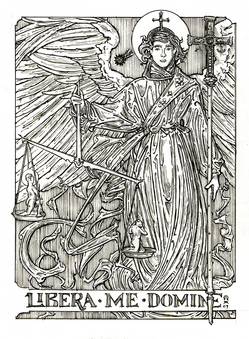 The Prayer to Saint Michael the Archangel
The Prayer to Saint Michael the Archangel
Pope Leo XIII speaks of a vision he had at Mass that terrified him. In fact, there seems to be a variety of versions of the narrative. As it goes, either the Pope saw devils congregating around the Holy See or he heard that it was granted to Satan to try to undermine the Church for the next one hundred years. Who is to doubt the either interpretation of the vision? As a result of the vision, Pope Leo composed this prayer to Saint Michael and ordered in 1886 that it be recited after every Low Mass. This custom was suppressed in 1964 as part of the official liturgical acts of the priest at Mass but the tradition of saying the prayer persists. The prayer evokes a strong sense of protection and confidence in the holy work of the Archangel and therefore I strongly recommend that you say it following Mass and daily if you don’t make it to Mass.
Personally, in the past year I started saying this prayer I learned as a child.
Saint Michael the Archangel,
defend us in battle;
be our protection against the wickedness and snares of the devil.
May God rebuke him, we humbly pray:
and do thou, O Prince of the heavenly host,
by the power of God,
cast into hell Satan and all evil spirits
who wander through the world seeking the ruin of souls. Amen.
The Latin text of the prayer is as follows:
Sancte Michael Archangele,
defende nos in proelio.
contra nequitiam et insidias diaboli esto praesidium.
Imperet illi Deus, supplices deprecamur:
tuque, Princeps militiae caelestis,
Satanam aliosque spiritus malignos,
qui ad perditionem animarum pervagantur in mundo,
divina virtute, in infernum detrude. Amen.
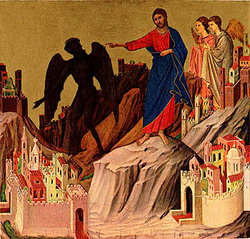 After having received baptism from John, Jesus enters that empty place, led by the Holy Spirit himself, which had descended upon him, consecrating him and revealing him as the Son of God. In the desert, the place of trial — as the experience of the people of Israel shows — there appears the dramatic reality of the “kenosis,” the emptying of Christ, who is stripped of the form of God (cf. Philippians 2:6-7). He, who did not sin and cannot sin, submits himself to trial and thus can have compassion for our infirmities (cf. Hebrews
After having received baptism from John, Jesus enters that empty place, led by the Holy Spirit himself, which had descended upon him, consecrating him and revealing him as the Son of God. In the desert, the place of trial — as the experience of the people of Israel shows — there appears the dramatic reality of the “kenosis,” the emptying of Christ, who is stripped of the form of God (cf. Philippians 2:6-7). He, who did not sin and cannot sin, submits himself to trial and thus can have compassion for our infirmities (cf. Hebrews 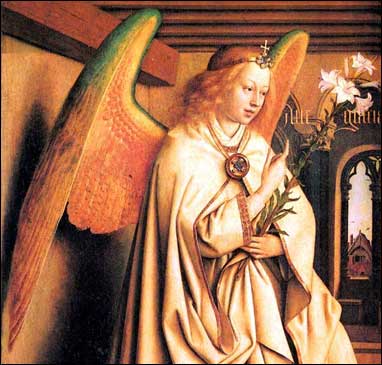 tempt the Lord, the angels, luminous and mysterious figures, fleetingly appear. The Gospel says that the angels “serve” Jesus (Mark
tempt the Lord, the angels, luminous and mysterious figures, fleetingly appear. The Gospel says that the angels “serve” Jesus (Mark 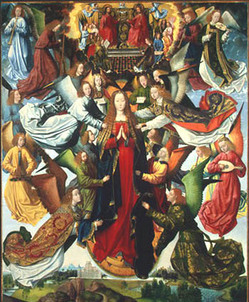 Dear brothers and sisters, we would take away a significant part of the Gospel if we left aside these beings sent by God to announce his presence among us and be a sign of that presence. Let us call upon them often, that they sustain us in the task of following Jesus to the point of identifying ourselves with him. Let us ask them, especially today, to watch over me and my co-workers in the Roman Curia as we begin our retreat this week, as we do every year. Mary, Queen of Angels, pray for us!
Dear brothers and sisters, we would take away a significant part of the Gospel if we left aside these beings sent by God to announce his presence among us and be a sign of that presence. Let us call upon them often, that they sustain us in the task of following Jesus to the point of identifying ourselves with him. Let us ask them, especially today, to watch over me and my co-workers in the Roman Curia as we begin our retreat this week, as we do every year. Mary, Queen of Angels, pray for us!